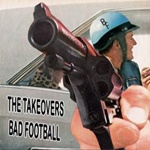The Takeovers, Bad Football
reviewed by dave heaton

"Playin' music for us," goes a line in one song on the new album by The Takeovers, Robert Pollard's collaboration with former Guided by Voices bassist Chris Slusarenko. And that's clearly what they're doing here. Where the first Takeovers album came off like a much stranger, more varied version of a GBV-style arena-rock album, this one seems all fun and games to them. Strange, strange games; fun if you can get yourself into their mindset, un-fun if you come bearing too many expectations.
This is not quite as strange as Pollard's overtly experimental projects, like the Circus Devils, but there's a serious side to those. This is more like a carefree, joking version of Pollard's style of surrealist pop/rock. It's spelled out in the album title Bad Football -- spelled-out, that is, within the crunch-rock fable "Little Green Onion Man". To especially thick, slow-churning hard rock Pollard sings in the exaggerated-rock star/tough guy voice he uses from time to time, making fun of himself perhaps. That combination is a grating one, probably by design, and right when you're getting sick of it he gets to these lyrics: "This song is giving me a bad taste / like licking stamps and drinking shitty coffee / it's what happens when witnessing bad football."
So what we're listening to is rock that knowingly puts a bad taste in your mouth: bad football. Or, just as likely, "bad football" refers to the whole game of hit-, trend- and crowd-chasing that Pollard and Slusarenko are choosing to completely opt out of here. That's reinforced by that song "Music for Us", at the very least. Here we've essentially got Slusarenko hitting piano keys like a two-year-old would, while Pollard sings lyrics that mock the music-business game. And if the point's not clear from his typically evasive lyrics, a fake radio announcer comes it and hammers it home: "Hey everybody – it's the station that'll play you all the smash sensations!"
The best songs here are the ones that take this conceit the furthest (best because they're fun, and occasionally hilarious, not because they're the next "Motor Away" or whatever), plus a couple moments where Pollard lets the game fade away enough to throw in a few excellent pop hooks that could be fodder for "smash sensations." The first song "You're At It" has a killer melody for its opening lines, but then kills it roughly, the line "this form of suicide's not quick enough / what else ya got?" implying the drudgery of playing by record-company rules. "Smokestack Bellowing Stars", despite the awkwardly edited-in dialogue clips, is the lone absolute beauty of a song crammed in between the jokes. For it the lyrics sheet just states "Great lyrics", in place of the actual lyrics; it's as if the other songs are ribbing it for trying too hard.
The two bullies on other side of that song are too of the goofiest songs here. The first is also one of the album's best songs, showing how you can turn a song against itself while also making it work as a song. A loud, brash and catchy one titled "Pretty Not Bad", the song is one joke about Pollard and his persona after another, from his "fake English accent" to his prolific songwriting habits. "I'm gonna do it again," he taunts. He's gonna write another song! With "pretty not bad" as the not-so strict criteria for whether it's worth releasing.
A few songs later the Takeovers take the absurdity level up a notch, which is something for an album that already has both a song about Pollard's dog pissing on his passed-out brother and one with the sole lyric "The Jester of Helpmeat is not fucking around", repeated like a stern warning a handful of times and then cast aside, as if out of boredom. Anyway, the one that tops those is "Kicks at the Gym", an over-the-top metal number with Pollard screaming about how his gang of tough guys do it – "Here's where we get it on / we get our kicks at the gym!", "gym" stretched out for emphasis. Halfway through he offers a cuss-fest about how he can't do it…whether the "it" is sing the song, work out at the gym, or sing something prettier, I'm not sure. "One time I guess," he sings late in the song, with the same aggressive nonchalance of this whole endeavor. It's an album that's sure to be written off by critics as lazy or superfluous, but it's already made those qualities a central, proud part of its aesthetic, so the ball's in their court.
Copyright (c) 2007 erasing clouds |
|